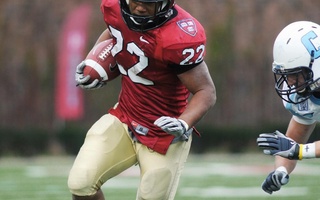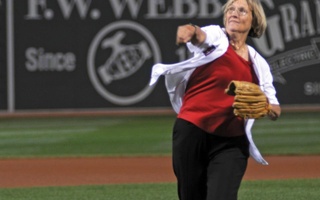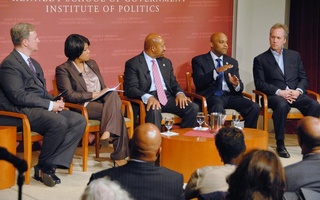PHILADELPHIA--The alumni in Philadelphia are homeless. They have a club and a building fund--$15,000 committed to finding a place that can be called a clubhouse--but chances are the money will never be spent that way. For most of the 1100 Harvard alumni in this city of over two million residents, particularly the more than 800 metropolitan-area members currently on the Harvard Club rolls, the problem of finding a place to gather for lunch or a few drinks is not a pressing one. And yet this lack of a clubhouse and the question of what to do with the spare $15,000 are two issues that go a long way towards explaining how alumni in a given city operate. And in Philadelphia's case, the issues illuminate the roles that alumni play both as an elite in a major American city, and as graduates of a college that still strongly holds their interest.
C. Walter Randall, '36, is the archetype of the old-school Harvard grad. Not a Philadelphian by birth but a fairly long-time resident in a wealthy hidden-away province, southwest of the city. Randall represents the interests of a small faction of older alumni interested in restoring some element of "clubbiness" to Philadelphian graduates. Randall sees the present club's chieftains--who do a great deal to mold the policies of the alumni in the city--as a looseknit, often too business-like group of younger turks who believe the club's only duty is soliciting new membership dues.
While the younger alumni pile into Penn's Franklin Field or Princeton's Palmer Stadium to catch a glimpse of Joe Restic's boys, Randall's always out there cheering on the more unheralded Crimson ambassadors--the cagers, the hockey players, and even the anonymous tennis and track teams on occasion.
The dichotomy, however, runs much deeper than sports attendance. Randall is one of what he calls six stalwarts who eat lunch regularly at the Harvard Club's last vestige of an address, a small suite of rooms in the Princeton Club. It is both a source of embarassment to the traditionalists to have to dine in an Ivy rival's club and a constant reminder that the club should augment its $15,000 endowment and take up residence in its own clubhouse where Harvard gentlemen can sneak a smoke and a quick drink between court cases and bank transactions. But the recent grads, including most of the Harvard Club's one-year-old slate of officers, brush off the old school's contentions. "Look, Philadelphia is a Princeton town," says David R. Scott '60, a lawyer in one of the town's largest law firms and vice president of the club, explaining the odd placement of the Harvard room. "We are the poor sisters in this city, and other schools like Penn are not even social pretenders."
Anyway, Steven Simpson '66, also a lawyer and co-chairman of the powerful Harvard schools and scholarships committee of Philadelphia, says many of the alumni belong to the exclusive Merion and Philadelphia Cricket Clubs and other private clubs that make owning a large Harvard clubhouse in town superfluous. Simpson explains that most alumni nowadays don't live in center city, but more often come home to the Main Line in fashionable southwest Philadelphia or Chestnut Hill, the silkstocking district that barely falls within the city's northwestern limits.
Scott finds the question of Harvard's clubhouse to be simply one of the issues that are causing Harvard's club members in Philadelphia to ask themselves "Why are we existing?" He cites waning attention at club functions--110 at the big annual dinner. 60 Harvard grads and 50 wives--and a couple of affairs with Harvard luminaries like the luncheon with John H. Parry. Gardiner Professor of Oceanic History and Affairs, that attracted only 40 members. "Maybe we are spreading ourselves too thin?" he asks. "But we are still an active organization."
The man many alumni are looking to for the answers confronting the club and the role of Philadelphia alumni in general is Martin A. Hecksher '56, also a lawyer and a resident of Chestnut Hill. Hecksher is not anxious to discuss specifics about the club's problems with finding a home, except that a study being made on the question has made no recent progress--but he does place the club's priorities far away from any goal of increased clubbiness He says he sees his role in the club as three-fold: to maintain Harvard ties; keep up on the intellectual end of the school, specifically finding qualified candidates to send to Harvard; and fund raising, especially for area boys going to Harvard.
As for his first goal, he says, "I'd break my neck to get up to Harvard more often." He and many other alumni who don't get up to Harvard more than a couple of times a decade keep contact with the school through Harvard Today and through scuttlebut from their own and neighbors' sons. Some, like Scott, have at times subscribed to Harvard Sports News and Views, and Randall notes that those who dine at the Harvard room glance at the Independent, Gazette, and Crimson for the latest Harvard news. But as for common identification with the school in terms of everyday life, football games seem to be the only time Philly alumni will cheer together on the same side. Philadelphia alumni rarely coalesce on the same issue, Hecksher says. "Even when Clark [Joseph S. Clark '23, blue-ribbon mayor in the city during the '50's and later a Pennsylvania senator] was running for mayor there were only stray followers." Louis G. Hill '46 of Chestnut Hill, a mayoral candidate whom Mayor Frank Rizzo overwhelmed in a recent primary, also failed to engender much Harvard-related support, Hecksher says.
"I'm not aware of any evidence that Philadelphia alumni are a cohesive group which has any special view," says Thomas A. Masterson '49, a former federal district court judge who retired into private practice last year. "Nor am I aware of efforts to articulate any special view or approach." Masterson notes that "Harvard alumni are active in all the major businesses, professions and educational institutions in Philadelphia," and that "a fair number of people are at the top of those institutions." But he is quick to add. "Their political and social philosophies encompass a wide range of views with no identifiable single force. In short I doubt there is any controversial issue in present day society which the majority would agree upon," he says.
Nor do the Harvard alumni act as a particularly unified elite. Simpson, of the schools and scholarships committee, says despite the proximity of many of the club members, most of whom, he says, live and work within 1000 feet of each other, the really cohesive and identifiable group in town is not Harvard at all but the Princeton grads who exert a noticeable economic and social power. "If you put ten Princeton men and ten Harvard men in a room together, you'll be able to pick out the Princeton grads immediately," he explains.
Where many alumni do exert a unifying force is in their more casual interests about who gets into the College from the Philadelphia area. Almost all of the Harvard Club's officers were gleeful to see that Harvard this year admitted 23 students from the area, an increase of six over the previous year. A common strain of complaints issued by those involved with the Philadelphia end of admissions is that the metropolitan area should not be lumped in a region including the prolific Long Island school district, because the grouping heightens the competition for places to its fiercest level in the nation. "But last year we really squawked about it and this year we are higher," Hecksher exclaims proudly.
William A. Humenuk '64, co-chairman of the schools and scholarship committee, does more to determine the make-up of those 23 admittees than almost any single alumnus in the Philadelphia area. It is Humenuk's job to notify Harvard of particularly attractive candidates, to go into the schools and meet guidance counselors, attend high school college nights and check the local papers for write-ups of exceptional scholar-athletes that may appear. Humenuk, a lawyer from Chestnut Hill, has been at the job for an exhausting four years. In that time he has tried to redirect, as much as one man can, the Harvard admissions office from choosing solely from Philadelphia's more prestigious prep schools--as has always been the case--to at first some unexamined outer suburban schools, and then the forgotten parochial and inner city schools.
Humenuk says he is a little dissatisfied with the way the admissions process currently works. He complains about getting little assistance from other alumni who prefer the easier candidate interviewing to going into the non-traditional schools and trying to convince guidance counselors to encourage their kids to apply. And one of the single biggest obstacles he faces is little direction from the Harvard admissions office directors, whom he regularly asks to spend more time in Philadelphia recruiting in the unexamined schools. With the exception of a list of basketball and football players worth checking from the Athletic Office, Humenuk says he receives few orders or suggestions from Harvard.
This lack of direction and local aid may be the reason for the lopsided distribution of the 23 acceptances, which reveals that with the exception of a few students from exclusive Main Line suburbia and one student from the city's "private" public school--Central High--almost every student coming to Harvard from Philadelphia will be from the same old traditional private schools. Not one student was admitted from the almost all-black inner-city schools or from any of the poor white Catholic schools.
"I think the Philadelphia alumni is one of the best groups for getting quality candidates," says E. Bradley Richardson '53, associate director of Harvard admissions and the man who handles Philadelphia for the office. But Richardson says. "The thing that worries us is recruitment in inner-city schools. We met two weeks ago with Philadelphia alumni to try to get some kind of established committee to look into why we can't get more students to apply from the inner city. I think we can do a better job in Philadelphia." But Philadelphians claim if the University wants to get more students from these untapped schools, it will have to do more than supply once-a-year encouragement.
Read more in News
Princeton Booters Bow to CrimsonRecommended Articles
-
Election RoundupIN PHILADELPHIA: There were no surprises as Mayor Frank Rizzo rolled to an easy victory, toppling two opponents in his
-
'BAMA SLAMMA: Six Degrees of Will FrankThink you’ve got it tough? It’s March Madness Eve. As you read this with your breakfast, kids like you will
-
 LIVE BLOG: Football vs. Penn
LIVE BLOG: Football vs. Penn -
Comedy Comradery: Life Lessons from Cary GrantIt’s a cliché story of childhood friendship: We were misfits. We were three girls who read too much, had awkward bodies, and liked to quote Monty Python.
-
 Faust Shares Her Thoughts On Baseball
Faust Shares Her Thoughts On Baseball -
 Occupy Protesters Interrupt Forum
Occupy Protesters Interrupt Forum













